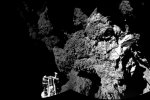
Though the Philae lander was short-lived on the surface of Comet 67P/Churyumov-Gerasimenko, it was able to return scientific data back to Earth from the first samples ever obtained directly from a comet’s nucleus. During its successful 60-hour-long primary science mission last week, Philae made a very important discovery: the comet contains organic molecules.
Not much has been released about the molecules so far, with the Wall Street Journal breaking the news on Monday. The molecules are carbon-based, but no word has been given on what other elements are present, or how complex they may be. Complex organic compounds, like amino acids, are the building blocks to life.
Philae’s mission was to determine which, if any, organic compounds existed on comets. This knowledge will allow scientists to determine if comets brought the necessary ingredients for life to early Earth. The conditions on the young Earth were not favorable for making those compounds, and it is most likely that they came from an outside source.
The discovery of the molecules was made with Philae’s Cometary Sampling and Composition Experiment (COSAC) instrument. This device analyzes compounds present in the comet’s thin atmosphere, seeking out organic and volatile compounds.
As of right now, it is hard to tell when additional information will be provided about the nature of these molecules, and what implications they may have.
"It's more likely there's sintered ice at the surface with more porous material lower down that hasn't been exposed to the Sun in the same way."
After bouncing off the surface at least twice, Philae came to a stop in some sort of high-walled trap.
"The fact that we landed up against something may actually be in our favour. If we'd landed on the main surface, the dust layer may have been even thicker and it's possible we might not have gone down [to the ice]," said Prof McCaughrean.
Scientists had to race to perform as many key tests as they could before Philae's battery life ran out at the weekend.
On re-charge
A key objective was to drill a sample of "soil" and analyse it in Cosac's oven. But, disappointingly, the latest information suggest no soil was delivered to the instrument.
Prof McCaughrean explained: "We didn't necessarily see many organics in the signal. That could be because we didn't manage to pick up a sample. But what we know is that the drill went down to its full extent and came back up again."
"But there's no independent way to say: This is what the sample looks like before you put it in there."
Scientists are hopeful however that as Comet 67P/Churyumov-Gerasimenko approaches the Sun in coming months, Philae's solar panels will see sunlight again. This might allow the batteries to re-charge, and enable the lander to perform science once more.
"There's a trade off - once it gets too hot, Philae will die as well. There is a sweet spot," said Prof McCaughrean.
He added: "Given the fact that there is a factor of six, seven, eight in solar illumination and the last action we took was to rotate the body of Philae around to get the bigger solar panel in, I think it's perfectly reasonable to think it may well happen.
"By being in the shadow of the cliff, it might even help us, that we might not get so hot, even at full solar illumination. But if you don't get so hot that you don't overheat, have you got enough solar power to charge the system."
The lander's Alpha Particle X-ray Spectrometer (APXS), designed to provide information on the elemental composition of the surface, seems to have partially seen a signal from its own lens cover - which could have dropped off at a strange angle because Philae was not lying flat.
Last edited:
